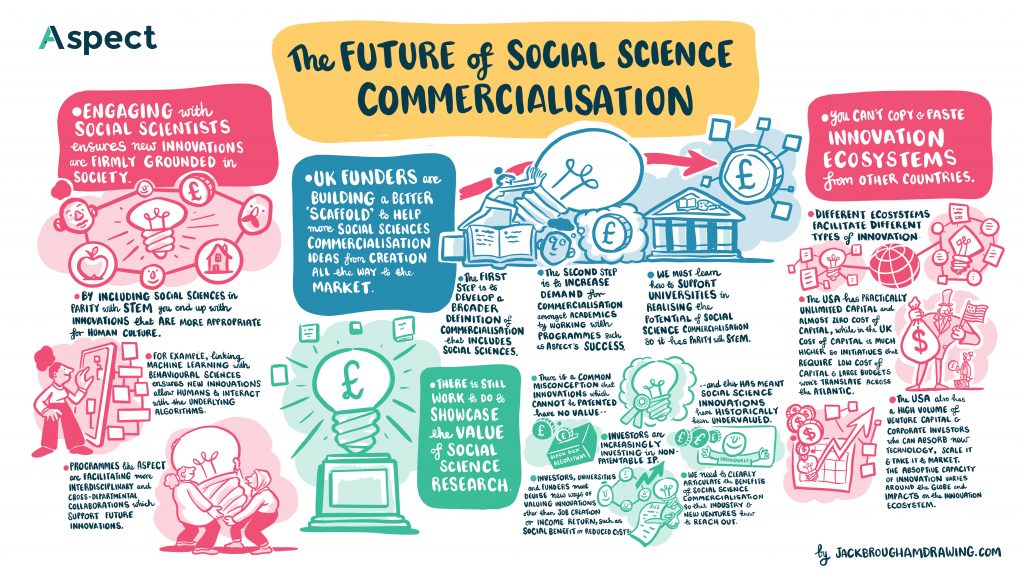Webinar recording
Panel members
- Professor Julia Black (Chair) – Strategic Director of Innovation and Professor of Law at the LSE, and Chair of the Aspect Steering Group
- Melanie Knetsch – Deputy Director, Innovation and Impact, ESRC:UKRI
- Ian Tracey – Co-Founder, Anchored In
- Vikas Shah MBE – CEO, Swiscot Group and Honorary Professor of Business, University of Manchester
Slide deck
Session highlights video
Session summary

This session explored where the biggest opportunities lie for the commercialisation of social sciences, and how academia and industry can look to take advantage and Aspect’s future plans in terms of driving and supporting social science commercialisation.
Some key messages were:

Engaging with social scientists ensures new innovations are fundamentally grounded in society. By including social sciences, and more broadly humanities and the arts, in parity with STEM when developing a new technology, you end up with innovations that are more appropriate for human culture. For example, linking machine learning and behavioural sciences ensures any new innovation can have an easy to use interface that allows humans to interact with the underlying algorithms. Programmes like Aspect are facilitating more interdisciplinary and cross department collaborations that support the creation of innovations of the future.

UK funders are building a better ‘scaffold’ to help move social sciences commercialisation ideas from creation all the way to market. The first step has been to make the definition of commercialisation broader and more inclusive for the social sciences. The second step has been to work with initiatives such as Aspect’s SUCCESS programme to increase demand for commercialisation amongst academics and figure out what specific training is required for social scientists. The next step is to figure out how to support universities in realising the potential of social sciences commercialisation so that it is given the same status and attention as STEM commercialisation. However, it is not just down to UK funding bodies to build this ‘scaffold’ of support for social sciences commercialisation. There are other support structures and sources of funding such as venture philanthropists or encouraging academics to start off with consultancy to generate revenue and gather direct market insight.

There is still work to be done to showcase the value of social sciences research. There is a common misconception that if an innovation cannot be patented that it can’t be valued. Historically, this has led to social sciences innovations being undervalued. However, investors are increasingly investing in companies with significant amounts of non-patentable IP such as a black box algorithm, a brand or even an individual. Investors, universities, and funders need to come up with additional ways of valuing the social benefit and/or savings that social sciences innovation can bring and not just focus on income return and job creation. These benefits also need to be clearly articulated so that new ventures and industry are more aware and know to reach out to and engage with social scientists.

You can’t just copy and paste innovation ecosystems from other countries. Different innovation ecosystems facilitate different types of innovation and it isn’t as simple as copying and pasting policies from one country and hoping they will work in another. For example, the USA has a very strong innovation ecosystem but is benefitted by two key factors that are not easy to replicate overseas. Firstly, the USA has practically unlimited capital with almost zero cost of capital. In the UK, the cost of capital is much higher and so the same initiatives that require large budgets with low cost of capital won’t easily translate across the Atlantic. Secondly, the USA has a high volume of venture capital and corporate investors who can absorb new technology and quickly scale it up and take it to market. The absorptive capacity of innovation by investors and industry varies around the globe and impacts on the innovation ecosystem.




